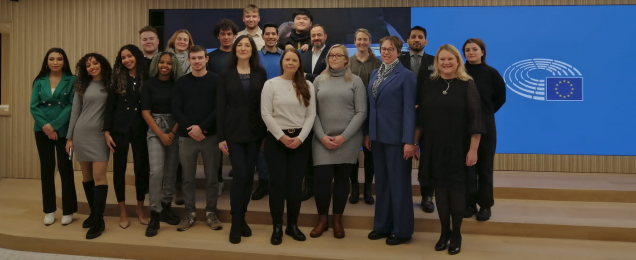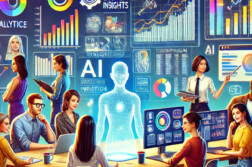The annual study trip of International Business students to Brussels took place on December 5-9, 2022. During that time, twenty students and four teachers participating the trip got to know some of the most important institutions of the European Union, the history and development of the Union, and its future. This article talks about the places visited during the study trip and the students’ views on Europeanness and the European Union. The students’ views are taken from their learning assignments.
Historical perspective: shaping Europe
During the study trip, the group got to know the history of Europe in two museums. The House of European History presents the development of Europe and the international phenomena that influenced it. The museum talks about history primarily from a European point of view, but at the same time it combines and compares the common experiences of different countries. The second place to visit was the Parlamentarium, which is the Visiting Centre of the EU Parliament. It explains the path towards European cooperation, how the European Parliament works and what its members are doing to meet the challenges of today.
In the students’ opinions, how has the history influenced the development of the European Union? What kind of themes did they raise about the development of Europeanness? The students strongly highlighted two key issues as a basis of European integration: the need for secure Europe after World War II and the historical value base that connects European countries to each other.
- “I believe that the history of the European Union has proved that there is strength and power in a large number of people, and that is the greatest guarantee of peace in Europe.”
- “Our roots have evolved from the ancient Greeks values of justice, beauty, intellect, and honour.”
- “The European Union was founded on the values of freedom of speech, peace, freedom, and equality.”
- “We Europeans, despite of our cultural differences, have the same mentality and basic values. These principles connect all European nationalities together.”
Current perspective: building European identity
On the study trip, the group got to know the institutions of the Union. The visiting places were the EU Parliament, the European Economic and Social Committee, the European Committee of the Regions, and the Tampere Regional EU office. Presenters provided information on how the EU’s legislative system works, how different actors and institutions are networking and what opportunities citizens have in influencing.
Many students stated that during the visits their perspective on the European regime of legislation and influence possibilities expanded vastly. Nevertheless, how do students see themselves currently as Europeans? Many of them identified oneself primarily as representative of one’s own nationality and only secondarily as European. The EU seemed to be somewhere far away especially from the northern countries. Likewise, the opportunities to influence were seen as quite distant. However, recent crises like pandemic and war in Ukraine have brought EU and its meaning closer.
- “First and foremost, I am a citizen of Finland, and I am very proud of my nationality. Also, many people from this area do not seem to even identify strongly as European.”
- “I put myself on the furthest outskirts of the European Union, because I do not see myself as a European citizen, I do not think that I can make a difference in the whole union like I can in my own country.”
- “We need to accept the fact that there are always areas in which some of us are ignorant, while others know what they are doing.”
Future perspective: strong Europe both locally and globally
How will the union develop in the coming years and decades? Based on the presentations heard during the study tour, a strong belief in democracy and respect for individual freedoms will be at the centre of the Union’s development as well in the future. One of the key future goals seems to be to increase the voice and influence the opportunities of EU citizens and to bring the EU closer to each of its citizens. Globally, the goal is the strengthening the EU’s voice in world politics by improving the EU’s position as an actor of strong, open, and fair trade, multilateralism, and international order.
The students mentioned as important future goals for European Union the following issues: the unity of the European Union, EU as a global actor, sustainability and strengthening the EU’s crisis management capacity.
- “European Union makes our part of the world more forceful and one of the most important players on the world stage. Together we can make our voice heard.”
- “In 10 years, the citizens of Europe should have changed their point of views and live in a more circular and sustainable way.”
- “I trust that European Union will be more self-sufficient in the future.”
Authors:
Leena Mäkinen, senior lecturer in Business Administration
Annaleena Kolehmainen, senior lecturer in International Business




